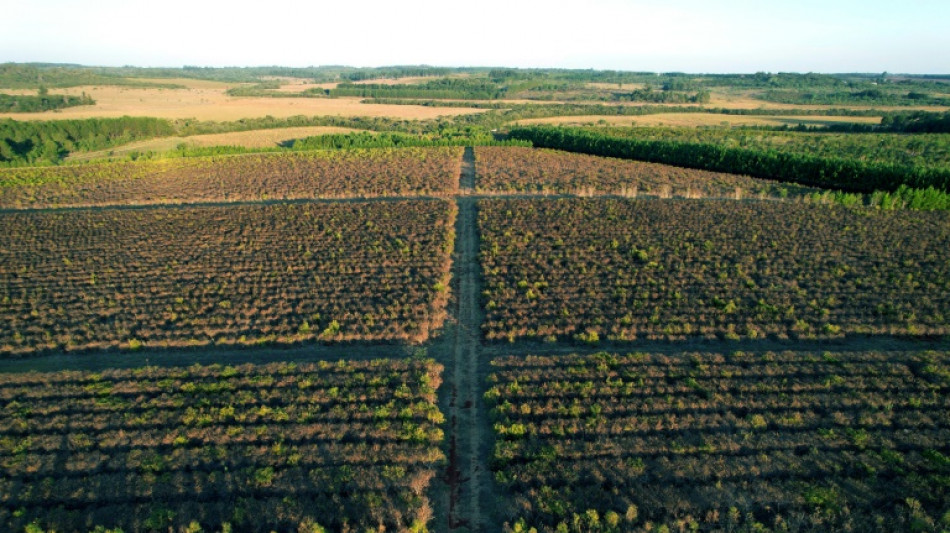
-
 Japan PM's tax giveaway roils markets and worries voters
Japan PM's tax giveaway roils markets and worries voters
-
Amid Ukraine war fallout, fearful Chechen women seek escape route

-
 Rybakina surges into Melbourne semis as Djokovic takes centre stage
Rybakina surges into Melbourne semis as Djokovic takes centre stage
-
Dollar struggles to recover from losses after Trump comments

-
 Greenland blues to Delhi red carpet: EU finds solace in India
Greenland blues to Delhi red carpet: EU finds solace in India
-
Will the EU ban social media for children in 2026?

-
 Netherlands faces 'test case' climate verdict over Caribbean island
Netherlands faces 'test case' climate verdict over Caribbean island
-
Rybakina stuns Swiatek to reach Australian Open semi-finals

-
 US ouster of Maduro nightmare scenario for Kim: N. Korean ex-diplomat
US ouster of Maduro nightmare scenario for Kim: N. Korean ex-diplomat
-
Svitolina credits mental health break for reaching Melbourne semis

-
 Japan's Olympic ice icons inspire new skating generation
Japan's Olympic ice icons inspire new skating generation
-
Safe nowhere: massacre at Mexico football field sows despair

-
 North Korea to soon unveil 'next-stage' nuclear plans, Kim says
North Korea to soon unveil 'next-stage' nuclear plans, Kim says
-
French ex-senator found guilty of drugging lawmaker

-
 US Fed set to pause rate cuts as it defies Trump pressure
US Fed set to pause rate cuts as it defies Trump pressure
-
Sleeping with one eye open: Venezuelans reel from US strikes

-
 Venezuela's acting president says US unfreezing sanctioned funds
Venezuela's acting president says US unfreezing sanctioned funds
-
KPop Demon Hunters star to open Women's Asian Cup

-
 Trump warns of 'bad things' if Republicans lose midterms
Trump warns of 'bad things' if Republicans lose midterms
-
Russian strikes in Ukraine kill 12, target passenger train

-
 With Maduro gone, Venezuelan opposition figure gets back to work
With Maduro gone, Venezuelan opposition figure gets back to work
-
Celebrities call for action against US immigration raids

-
 Rubio to warn Venezuela leader of Maduro's fate if defiant
Rubio to warn Venezuela leader of Maduro's fate if defiant
-
Denver QB Nix 'predisposed' to ankle injury says coach

-
 Lula, Macron push for stronger UN to face Trump 'Board of Peace'
Lula, Macron push for stronger UN to face Trump 'Board of Peace'
-
Prass stunner helps Hoffenheim go third, Leipzig held at Pauli

-
 Swiss Meillard wins final giant slalom before Olympics
Swiss Meillard wins final giant slalom before Olympics
-
CERN chief upbeat on funding for new particle collider

-
 Trump warns US to end support for Iraq if Maliki returns
Trump warns US to end support for Iraq if Maliki returns
-
Judge reopens sexual assault case against goth rocker Marilyn Manson

-
 South Korea's ex-first lady to learn verdict in corruption case
South Korea's ex-first lady to learn verdict in corruption case
-
Rosenior dismisses Chelsea exit for 'untouchable' Palmer

-
 Markram powers South Africa to win over West Indies
Markram powers South Africa to win over West Indies
-
Vladimir Padrino: Venezuela's military power broker

-
 Amazon closing Fresh and Go stores in Whole Foods push
Amazon closing Fresh and Go stores in Whole Foods push
-
Koepka nervous about game and fans in PGA Tour return

-
 Trump's Iowa trip on economy overshadowed by immigration row
Trump's Iowa trip on economy overshadowed by immigration row
-
Dortmund coach says Inter Milan are improved under Chivu

-
 US border chief in Minneapolis as Trump tries to calm crisis
US border chief in Minneapolis as Trump tries to calm crisis
-
What to know about America's colossal winter storm

-
 Iran warns against 'instability' after US strike group arrives
Iran warns against 'instability' after US strike group arrives
-
GM reports quarterly loss but boosts shareholder returns

-
 US banks fight crypto's push into Main Street
US banks fight crypto's push into Main Street
-
NFL Bills make offensive coordinator Brady new head coach

-
 TikTok settles hours before landmark social media addiction trial
TikTok settles hours before landmark social media addiction trial
-
Newcastle braced for 'ultimate test' against PSG after storm disruption

-
 Brook blitz ends Sri Lanka's unbeaten home run, England clinch series
Brook blitz ends Sri Lanka's unbeaten home run, England clinch series
-
LVMH 2025 net profit drops 13% to 10.9 bn euros

-
 Philip Glass pulls Kennedy Center premiere after Trump takeover
Philip Glass pulls Kennedy Center premiere after Trump takeover
-
Slot says Liverpool must fix 'very bad cocktail'


Restoring damaged land key to climate, biodiversity goals
Unsustainable farming is on track to increase the amount of severely degraded land by an area the size of South America by mid-century, a UN report warned Wednesday, as experts said restoration was a matter of "survival".
Global food systems are responsible for 80 percent of deforestation and 70 percent of freshwater use, said the report.
They are also the single largest driver of species extinction, which is occurring 100 to 1,000 times more rapidly today than when human activity began to radically change the climate and degrade nature.
"The risk of widespread, abrupt or irreversible environmental change will grow," the Global Land Outlook 2 report warns.
The 40 percent of Earth's non-frozen land denatured by chemical-intensive exploitation threatens roughly half of global GDP, some $4 trillion, according to the 250-page peer-reviewed assessment, which called for action "on a crisis footing".
"How we manage and use land resources is threatening the health and continued survival of many species on Earth, including the human species," Ibrahim Thiaw, Executive Secretary of the UN convention charged with reversing land degradation told AFP.
"Business as usual is not a viable pathway for our continued survival and prosperity."
The flagship report of the UN Convention to Combat Desertification (UNCCD) comes two weeks before the treaty's 197 parties meet for the first time in three years, in Abidjan.
Adapting to an increase in drought and transitioning to sustainable agriculture top an agenda more broadly focused on restoring the health of one of Earth's vital resources: land.
- Agriculture's 1% -
At least 70 percent of ice-free land on Earth has been converted to human use, and most of that has been degraded. That means that things do not grow as much or as well as they used to.
"There's not a lot of land left," UNCCD chief scientist Barron Orr told AFP. "And yet, we still see an accelerated rate of land use change taking place."
The report reveals a startling level of concentration in the production of food.
At one extreme, one percent of agribusinesses control 70 percent of the world's agricultural land. At the other extreme, 80 percent of farms comprise only 12 percent of all farmland.
"The solution, at least in the initial phase, is not going to be converting land back to small holders," said Orr.
"It's making sure we move large agriculture into a much more sustainable space."
- Climate and nature -
The UN Paris Agreement's cornerstone climate goal is capping global warming below two degrees Celsius, and the biodiversity convention is aiming later this year to carve out 30 percent of Earth's surface as protected areas.
For the desertification convention, the core goal is "land degradation neutrality" by 2030.
Behind the cumbersome name is a simple concept that can be summed up as "no net loss": to ensure that, by 2030, the amount of degraded land in a given country has not expanded compared to a 2015 baseline.
Previously, the international response has been bogged down in arguments about metrics.
That problem hampered progress on the Great Green Wall, an ambitious, multi-decade scheme to reclaim agricultural land from the desert along the Sahel stretching 7,000 kilometres (more than 4,000 miles) from the Atlantic Ocean to the Red Sea.
Countries could not agree on how to monitor and measure progress. But the new benchmark is far easier to apply, said Orr.
- Competing for land -
The report contrasts different development scenarios out to mid-century.
A "business-as-usual" approach would see an additional 250 billion tonnes of CO2 or its equivalent released into the atmosphere by 2050 -- roughly four times current annual greenhouse gas emissions from all sources.
But a strategy of land restoration and protection could see the opposite: some 300 billion tonnes safely stored in soil and vegetation compared to a 2015 baseline -- equivalent to five years of current emissions.
Competition for land is heating up and there will be increasingly hard choices in the future over whether to carve out land for commodity crops, growing more food, C02-absorbing plantations, or to preserve as biodiversity corridors.
"We have to really think about that much more strategically," said Orr.
The report recommends for the first time scaling up the land rights of indigenous peoples as a climate solution and to ensure the success of projects to restore nature.
But indigenous groups, often shunted aside or pushed off their traditional homelands in the past, remain wary.
"We welcome new allies to this battle, including economic actors who are increasingly interested in avoiding climate risk, but we must make clear that we will not be used for greenwashing," said Jose Gregorio Diaz Mirabal, representing 511 indigenous groups in the Amazon basin.
"Partnering with Indigenous peoples requires embracing transformative change."
J.Fankhauser--BTB




